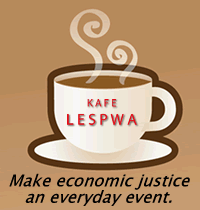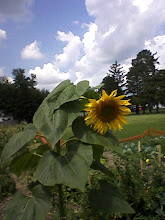One of the first things we'll do is set up stations for composting and recycling in the house. We already put out a plastic container with a lid for the compost. We will also need to find a large bin or some crates for recycling.
Compost and Community Gardening
Compost refers to any waste that can be put back into the earth to help build up the soil for local gardens. This will include vegetable peels, fruit cores, coffee grounds & filters, tea bags and eggshells. Grass clippings and leaves make for great compost, too.
Four Seasons City Farms will be a likely recipient of our compost. Our Catholic Worker community has been supporting their work for a couple of years. City Farms has community gardens in low-income areas in Columbus. These neighborhoods often have poor access to quality grocery stores. A third of their harvest also goes to support local food pantries.
Recycling
Columbus has set up convenient recycling stations all across town. Many schools and fire stations are drop-off locations. Most plastics as well as paper, cardboard, cans and glass can be recycled. Items do not even have to be separated--all recyclables can be all mixed together.
Click on this site for more detailed information about the program in Columbus. Stay posted, because as technology improves, more and more different kinds of items are accepted. Paper envelopes with a clear plastic window are accepted. Even most styrofoam can be recycled!
 It used to be that only certain plastics were recyclable , but now any with the recycling symbol with a number 1-7 are accepted, such as this example on the left.
It used to be that only certain plastics were recyclable , but now any with the recycling symbol with a number 1-7 are accepted, such as this example on the left.Click this site for an explanation of what the numbers mean.
Responsible Products and Future Ideas
We also have the desire to stock the Catholic Worker using recycled paper products, such as toilet paper and paper towels. While the shelf price for other items may be cheaper, they contain a hidden cost in damage to our air, land, water and the ecosystems around us. As a justice-minded community, we realize it is not responsible to help the poor while impoverishing the environment. This would only end up exacerbating global poverty in the long run.
Ideas are also circulating for an energy-efficient water heating system, which we discussed on Saturday with Bill, Cheryl and Mary. We are not sure which direction to go yet, but we are looking at "tankless" water heaters (which do not waste energy keeping a tank of water hot all day) or solar powered systems. If you have any ideas along these lines, please bring them forward.





No comments:
Post a Comment